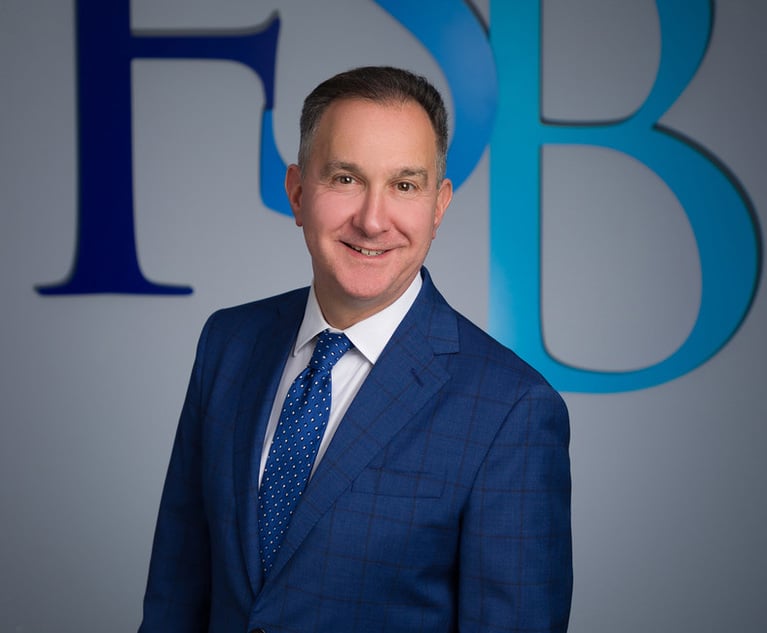 Photo: Shutterstock
Photo: ShutterstockMurphy Signs Bills Targeting State's Foreclosure Crisis
The new laws—nine in all—are meant to assist homeowners facing the prospect of foreclosure and pave the way for community revival by addressing blight.
April 30, 2019 at 06:04 PM
5 minute read
Rate of foreclosures is one area in which the Garden State would rather not be ranked No. 1.
So a bipartisan bill package was signed into law by Gov. Phil Murphy intended to help New Jerseyans stay in their homes.
The new laws—nine in all—are meant to assist homeowners facing the prospect of foreclosure and pave the way for community revival by addressing blight.
“The foreclosure crisis has hurt our economy and jeopardized the economic security of too many New Jersey families,” said Murphy Monday at the bill signing in Atlantic City, which has been at the epicenter of the crisis. “Our communities cannot succeed while vacant or foreclosed homes sit empty or while families live in limbo. I am proud to sign these bills into law today and get New Jersey closer to ending the foreclosure crisis.”
The impetus for the laws stems from the May 2017 report released by Chief Justice Stuart Rabner and the Special Committee on Residential Foreclosures that Rabner created.
The report was the culmination of work from key stakeholders in the process, including the Administrative Office of the Courts.
Among the bills Murphy signed was A-664, which codifies the judiciary's Foreclosure Mediation Program, creating a long-term, permanent program to increase the number of people entering mediation and ensure that homeowners receive housing counseling assistance to provide them with the best possible outcomes.
At a Senate Budget Committee appearance on April 9, Judge Glenn Grant, the acting administrative director of the New Jersey courts, praised the mediation program for developing a more equitable system for both homeowners and lenders to resolve their disputes, thus helping to reduce the state's foreclosure rate.
A-664 provides that money from foreclosure filing fees and fines are to fund the Foreclosure Mediation Program.
“The foreclosure crisis hit the families of Atlantic County harder than almost any county in the nation. These bills offer a better path for the region and hope for families in despair,” said Jim Johnson, special counsel to Murphy, in a statement Monday.
New Jersey Housing and Mortgage Finance Agency Executive Director Charles A. Richman added: ”Foreclosure can take an emotional and financial toll on homeowners and their families. These bills bolster our efforts to help keep families in their homes and neighborhoods intact.”
The eight other foreclosure bills signed Monday by the governor are:
- A-4997: The Mortgage Servicers Licensing Act will require any person acting as a mortgage servicer to obtain a license from the commissioner of banking and insurance for each main office and each branch office where business is conducted.
- A-4999 requires filing of certain creditor contact information with a residential mortgage foreclosure complaint and pending legal action.
- A-5001 revises the statute of limitations for certain residential mortgage foreclosure actions from 20 years to six years from the date on which the debtor defaulted, and in situations in which the date of default is used as the method to determine when the statute of limitations has expired.
- A-5002 permits all common-interest community associations to record a lien for unpaid assessments, and provide limited priority over prior recorded mortgages and other liens for nine months' worth of unpaid customary assessments.
- S-3411 requires a receivership appointment application before certain foreclosure actions, requires a notice of intention to foreclose on a residential mortgage to be filed within 180 days before commencing foreclosure, and limits reinstatements of dismissed mortgage foreclosure actions.
- S-3413 makes certain changes to the summary action foreclosure process under the Fair Foreclosure Act by clarifying the method by which foreclosed properties can be sold on an expedited timeline.
- S-3416 clarifies that the New Jersey Residential Mortgage Lending Act applies to certain out-of-state persons involved in residential mortgage lending in state.
- S-3464 revises certain procedures for real estate foreclosure sales, and alters the adjournment of sale process.
“Foreclosures are tragic situations for New Jersey families that can also create public safety as well as quality-of-life issues for surrounding communities,” said Sen. Steve Oroho, R-Sussex, one of the sponsors of the bill package. “Doing our part to reduce the foreclosure rate statewide will protect families, make neighborhoods safer, and provide children the stability they need both at home and at school.”
Another sponsor, Sen. Troy Singleton, D-Burlington, added: “This issue is not new. However, the comprehensive approach outlined in these bipartisan laws is unprecedented in our state. They will build upon the continued reduction in pending foreclosure cases and shorten the timeline to adjudicate these cases.”
Assembly Speaker Craig Coughlin, D-Middlesex, said New Jersey led the nation in foreclosures, with about 70,000 properties going through the process in 2017 alone.
“Recognizing this problem, Chief Justice Rabner impaneled a blue-ribbon committee encompassing the public, private and nonprofit sectors to craft solutions, both legislative and regulatory, that were both fair and responsible to our state's residents and housing economy,” Coughlin said.
“These new laws will strengthen the mediation program in New Jersey by promoting remedy options for those homeowners in the initial stages of the foreclosure process,” said another sponsor, Sen. Ronald Rice, D-Essex.
Advocates also expressed support for the measures.
Renee Koubiadis, executive director of the Anti-Poverty Network of New Jersey, said the nine bills taken together ”will allow for a more transparent and fairer process for people facing default and will help alleviate New Jersey's persistent foreclosure crisis.”
“Particularly, the codification and funding of the Foreclosure Mediation Program will allow families receiving counseling and mediation to find a resolution to be able to stay in their homes,” she said.
This content has been archived. It is available through our partners, LexisNexis® and Bloomberg Law.
To view this content, please continue to their sites.
Not a Lexis Subscriber?
Subscribe Now
Not a Bloomberg Law Subscriber?
Subscribe Now
NOT FOR REPRINT
© 2024 ALM Global, LLC, All Rights Reserved. Request academic re-use from www.copyright.com. All other uses, submit a request to [email protected]. For more information visit Asset & Logo Licensing.
You Might Like
View All


Hit by Mail Truck: Man Agrees to $1.85M Settlement for Spinal Injuries
Trending Stories
Who Got The Work
Michael G. Bongiorno, Andrew Scott Dulberg and Elizabeth E. Driscoll from Wilmer Cutler Pickering Hale and Dorr have stepped in to represent Symbotic Inc., an A.I.-enabled technology platform that focuses on increasing supply chain efficiency, and other defendants in a pending shareholder derivative lawsuit. The case, filed Oct. 2 in Massachusetts District Court by the Brown Law Firm on behalf of Stephen Austen, accuses certain officers and directors of misleading investors in regard to Symbotic's potential for margin growth by failing to disclose that the company was not equipped to timely deploy its systems or manage expenses through project delays. The case, assigned to U.S. District Judge Nathaniel M. Gorton, is 1:24-cv-12522, Austen v. Cohen et al.
Who Got The Work
Edmund Polubinski and Marie Killmond of Davis Polk & Wardwell have entered appearances for data platform software development company MongoDB and other defendants in a pending shareholder derivative lawsuit. The action, filed Oct. 7 in New York Southern District Court by the Brown Law Firm, accuses the company's directors and/or officers of falsely expressing confidence in the company’s restructuring of its sales incentive plan and downplaying the severity of decreases in its upfront commitments. The case is 1:24-cv-07594, Roy v. Ittycheria et al.
Who Got The Work
Amy O. Bruchs and Kurt F. Ellison of Michael Best & Friedrich have entered appearances for Epic Systems Corp. in a pending employment discrimination lawsuit. The suit was filed Sept. 7 in Wisconsin Western District Court by Levine Eisberner LLC and Siri & Glimstad on behalf of a project manager who claims that he was wrongfully terminated after applying for a religious exemption to the defendant's COVID-19 vaccine mandate. The case, assigned to U.S. Magistrate Judge Anita Marie Boor, is 3:24-cv-00630, Secker, Nathan v. Epic Systems Corporation.
Who Got The Work
David X. Sullivan, Thomas J. Finn and Gregory A. Hall from McCarter & English have entered appearances for Sunrun Installation Services in a pending civil rights lawsuit. The complaint was filed Sept. 4 in Connecticut District Court by attorney Robert M. Berke on behalf of former employee George Edward Steins, who was arrested and charged with employing an unregistered home improvement salesperson. The complaint alleges that had Sunrun informed the Connecticut Department of Consumer Protection that the plaintiff's employment had ended in 2017 and that he no longer held Sunrun's home improvement contractor license, he would not have been hit with charges, which were dismissed in May 2024. The case, assigned to U.S. District Judge Jeffrey A. Meyer, is 3:24-cv-01423, Steins v. Sunrun, Inc. et al.
Who Got The Work
Greenberg Traurig shareholder Joshua L. Raskin has entered an appearance for boohoo.com UK Ltd. in a pending patent infringement lawsuit. The suit, filed Sept. 3 in Texas Eastern District Court by Rozier Hardt McDonough on behalf of Alto Dynamics, asserts five patents related to an online shopping platform. The case, assigned to U.S. District Judge Rodney Gilstrap, is 2:24-cv-00719, Alto Dynamics, LLC v. boohoo.com UK Limited.
Featured Firms
Law Offices of Gary Martin Hays & Associates, P.C.
(470) 294-1674
Law Offices of Mark E. Salomone
(857) 444-6468
Smith & Hassler
(713) 739-1250







